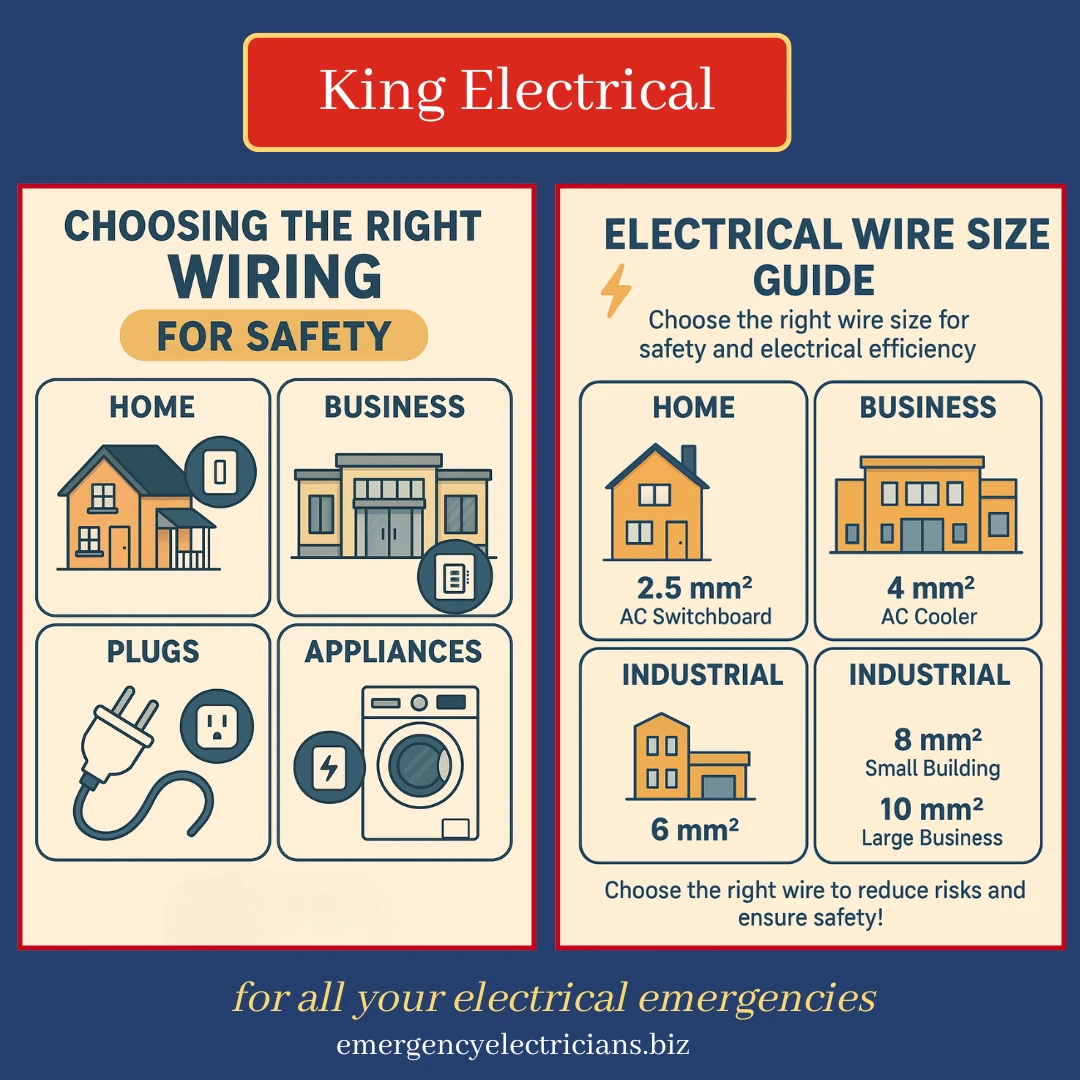At King Electrical, we believe in doing things right from the start. Below is a clear, practical guide to help you understand what size wire suits which type of job.
The size of an electrical cable refers to its cross-sectional area, measured in square millimetres (mm²). This is the standard in Ireland and across Europe.
A cable’s capacity depends on:
-
The current (amps) drawn by the load
-
The length of the cable run (longer runs increase voltage drop)
-
The installation conditions (e.g. buried, in conduit, or clipped direct)
In Ireland, all installations must comply with the National Rules for Electrical Installations (I.S. 10101:2020). This ensures safety, reliability, and regulatory compliance.
Below is a simplified guide outlining typical wire sizes for different environments. Use this as a reference, but always confirm based on your specific load and cable length.
|
Application |
Typical Wire Size |
Description |
|---|---|---|
|
Home circuits |
2.5 mm² |
Standard size for domestic sockets, lighting, and general circuits. |
|
Small business |
4 mm² |
Suitable for higher usage such as office equipment, small air conditioners, or lighting systems. |
|
Industrial (moderate load) |
6 mm² |
Common for machinery, workshop tools, and heavier electrical loads. |
|
Industrial (small building) |
8 mm² |
Used where there are multiple high-current devices or longer feeder runs. |
|
Industrial (large building) |
10 mm |
Examples in practice:
-
Domestic homes typically use 2.5 mm² cables for general circuits.
-
Offices and shops often require 4 mm² to support larger electrical demands.
-
Workshops and small industrial sites benefit from 6 mm² or 8 mm² cables.
-
Large industrial premises, warehouses, or factories often need 10 mm² or larger for main supply lines.
Choosing the right wire size isn’t just about the load. You must also factor in voltage drop, installation method, and future capacity.
-
Voltage Drop: Longer runs increase resistance, causing voltage to fall at the load end. Excessive drop can affect lighting brightness or machinery performance.
-
Cable Length: The longer the distance, the larger the cable size needed.
-
Installation Method: Cables buried underground or enclosed in conduits carry heat differently and may need upsizing.
-
Future Expansion: Always allow capacity for potential additional loads such as new equipment, EV chargers, or extensions.
-
Protective Devices: Breakers and fuses must match the selected cable’s current capacity.
If in doubt, oversizing slightly is usually safer than undersizing — provided it’s still cost-effective and practical.
Safety and Standards in Ireland:
-
I.S. 10101:2020 governs all electrical installations in Ireland.
-
Cables must comply with current-carrying, voltage drop, and insulation standards.
-
New twin-and-earth cables must include an insulated earth conductor of the same cross-section as the live conductors.
-
Always use certified cable and components that meet Irish and EU standards.
-
Consult an electrician or electrical engineer for high-load or long-distance circuits.
Professional Tips from the Field:
-
Allow room for future load growth – upgrading later is more costly.
-
Always use quality branded cable for safety and performance.
-
Label circuits clearly for maintenance and inspections.
-
Test voltage drop and insulation resistance after installation.
-
Never guess cable size — verify with load calculations or professional tools.
Selecting the right wire size is about balancing safety, efficiency, and cost. The guide below offers a helpful starting point:
-
Home: 2.5 mm²
-
Business: 4 mm²
-
Industrial: 6 mm²
-
Industrial (small building): 8 mm²
-
Industrial (large building): 10 mm²
Always confirm final sizing with proper calculations and professional advice.
At King Electrical, our team is fully certified and experienced in both residential and commercial wiring. We ensure every project meets Irish safety standards and is built to last.
If you’re planning new wiring, renovations, or an industrial installation, get in touch with King Electrical today for expert advice and a no-obligation quote.
Call: 085 127 5630
